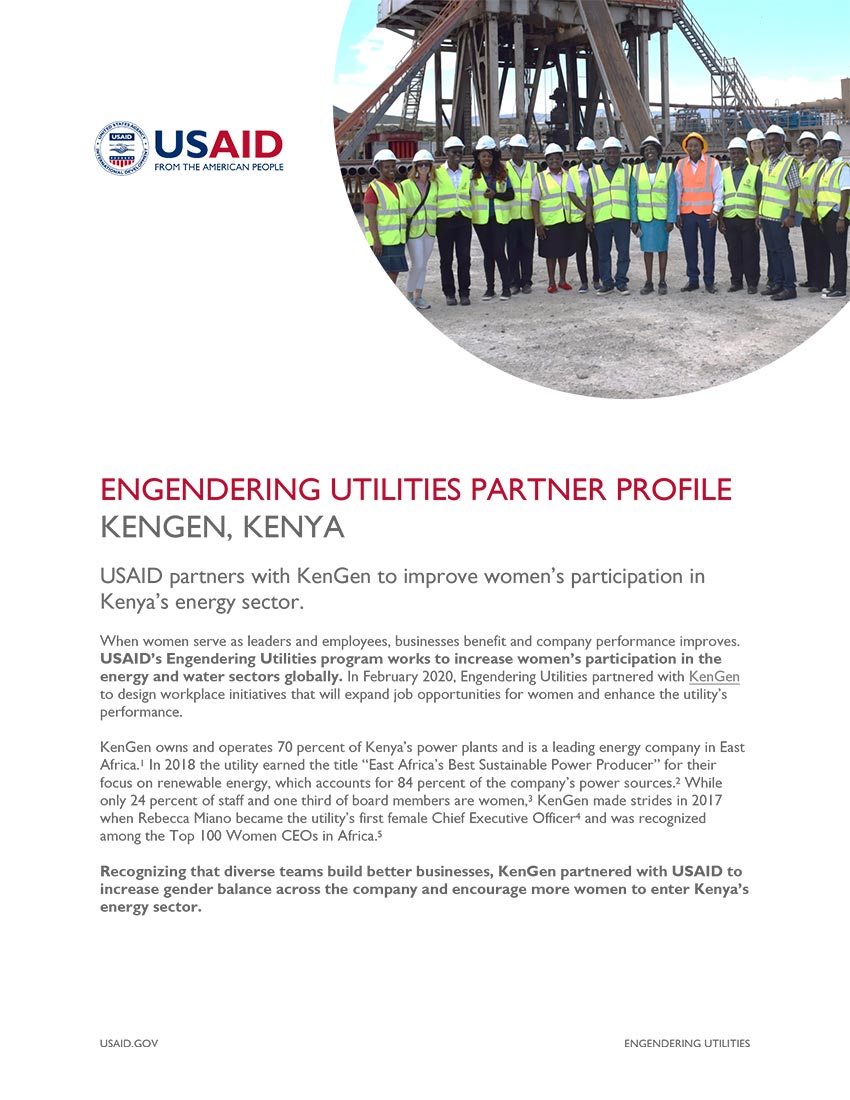- Energy Home
- How We Work
- Programs & Initiatives
- Smart Utilities
- Asia EDGE
- Auction Design Support to Colombia
- Energy Auctions for Kazakhstan’s Green Economy
- Energy Efficiency for Development
- Engendering Utilities
- About
- Business Case
- Approach
- Partners
- OSHEE, Albania
- SONABEL, Burkina Faso
- EDESUR, Dominican Republic
- DELSUR, El Salvador
- EEU, Ethiopia
- Energo-Pro, Georgia
- GRIDCo, Ghana
- BRPL, India
- TPDDL, India
- EDCO, Jordan
- IDECO, Jordan
- Miyahuna, Jordan
- KenGen, Kenya
- Kenya Power
- KOSTT, Kosovo
- LEC, Lesotho
- LEC, Liberia
- EGENCO, Malawi
- EDM, Mozambique
- EKEDC, Nigeria
- IBEDC, Nigeria
- ISWSC, Nigeria
- EVN, North Macedonia
- LASURECO, Philippines
- ZCWD, Philippines
- REG, Rwanda
- OFOR, Senegal
- Senelec, Senegal
- EVN, Vietnam
- Resources
- Stories
- Institutional Framework for Auctions in Mexico
- Powering Agriculture
- The USAID-NREL Partnership
- Scaling Up Renewable Energy
- EmPOWERing Women and Girls
- Competitive Energy Procurement
- Toolkits
- Monitoring & Evaluation
- Resources
- Stories
Speeches Shim
Engendering Utilities Partner Profile
KenGen owns and operates 70 percent of Kenya’s power plants and is a leading energy company in East Africa. Nearly 25 percent of staff and one third of board members at KenGen are women.
Kenya’s energy sector is experiencing massive growth, and the industry is poised to become a key source of jobs over the course of the next decade as the country pursues universal electricity coverage. Engendering Utilities’ work with KenGen will ensure women can capitalize on increased investment in Kenya’s energy sector as the industry and labor force expands.
Thirty years ago, only 40 percent of urban and zero percent of rural populations in Kenya had access to power. Recurrent drought and rising temperatures began impacting Kenya’s ability to produce hydropower, and power outages and rolling blackouts were common. The country began diversifying its energy sources, generating power from geothermal, wind, biofuels, and solar, alongside hydropower and oil. These strategic investments paid off, and today over 80 percent of urban and 58 percent of rural populations have access to electricity.
A complex web of contributing factors prevents women in Kenya from joining the formal workforce, particularly the male-dominated energy sector. Like many countries around the world, workforce inequities between Kenyan men and women begin in the education system. While girls and boys have similar rates of enrollment in primary and secondary school, few girls enroll in tertiary programs and even fewer pursue STEM fields. Today less than 20 percent of graduates from engineering, manufacturing, or construction programs in Kenya are women. Engendering Utilities is supporting KenGen to consider and respond to factors that reduce women’s workforce participation by building inclusive policies and practices that benefit men, women, and businesses in the energy sector.
USAID is supporting KenGen in its goal of increasing gender equality across the company’s business practices by providing change management coaching and leadership training, conducting a baseline assessment to identify gaps and opportunities for gender equality, and developing a strategic plan with KenGen to facilitate the company’s gender equality goals.
USAID will support and accelerate gender equality initiatives already underway at KenGen as part of the broader strategic action plan, including:
- Blue Power Network, an initiative that engages men across the company to be champions for change and equality leaders.
- Pink Energy, a professional women’s development network that connects women with opportunities across the organization.
- Gender Mainstreaming Policy, which expresses the utility’s commitment to addressing gender inequality within the company, which requires alignment with Ministry of Energy Gender Mainstreaming Policy targets and development of a supportive strategic action plan.


Comment
Make a general inquiry or suggest an improvement.